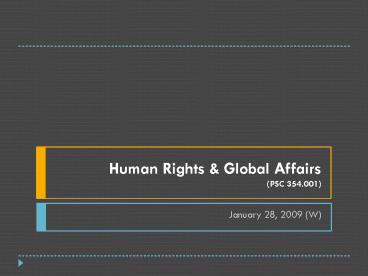Human Rights - PowerPoint PPT Presentation
1 / 8
Title:
Human Rights
Description:
Your assignments (presentations and response papers) ... Is the situation in Darfur genocide' ... Genocide does not require a totalitarian regime. ... – PowerPoint PPT presentation
Number of Views:107
Avg rating:3.0/5.0
Title: Human Rights
1
Human Rights Global Affairs (PSC 354.001)
- January 28, 2009 (W)
2
Today
- Index cards (missing students?)
- The quiz results
- Your assignments (presentations and response
papers) - Todays readings Straus, chapters 1/2 and
Hatzfeld - Summary of Chapter 1 (Straus, 1-16)
- Questions from Monday, 1/26
- Is the situation in Darfur genocide?
- The atrocities in the former Yugoslavia similar
to Rwanda? - Milgram experiment
3
The Order of Genocide
- Central question, 2 How and why did genocide
happen? - Specifically
- Why did Hutu hardliners choose genocide?
- Why did ordinary Hutus participate?
- Why did the genocide strategy succeed?
- Why did the international community fail to
intervene?
4
Modernization and atrocities
- Rwanda is a case of modern genocide.
- The current consensus has effectively dispelled
the idea that his was born out of ancient tribal
hatred. - However, important questions remain unanswered.
- Why did the elites choose genocide?
- Why were elites able to mobilize ordinary Hutus?
5
The book
- Focal points, 3
- Genocides local dynamics
- Evaluating explanations for the genocide
- Develop a theory of genocide in Rwanda
6
The Argument Three factors, 7
- The war.
- War provided a rationale for mass killing
(security), created insecurity and, legitimized
violence. - State institutions.
- Provided capacity to reach the local level.
- Provided authority to conduct the genocide.
- Geography.
- Ethnicity, 8/9
- Collective ethnic categorization allowed Hutus to
equate Tutsi with enemy.
7
Implications, 10
- Ordinary people commit extraordinary crimes.
- Fear of becoming victims in a (civil) war and
fear of authority. - No evidence for the role of utopian ideologies.
- Genocide does not require a totalitarian regime.
- No evidence for a long planned genocide instead
cumulative radicalization.
8
Lessons learned, 13
- Short-term A humanitarian intervention would
have saved lives, but only if implemented
quickly. - Stabilization.
- Strengthening Hutu moderates.
- Violence spread extraordinarily fast and required
immediate action to end. - Long-term Prevention
- No need to repress ethnic identities. Instead,
focus on eliminating the causes of coercive
mobilization/political violence.

